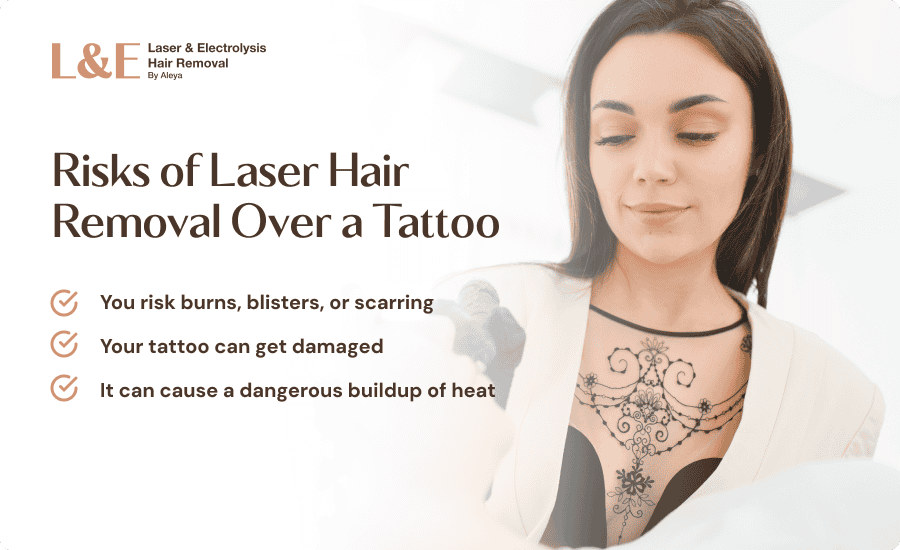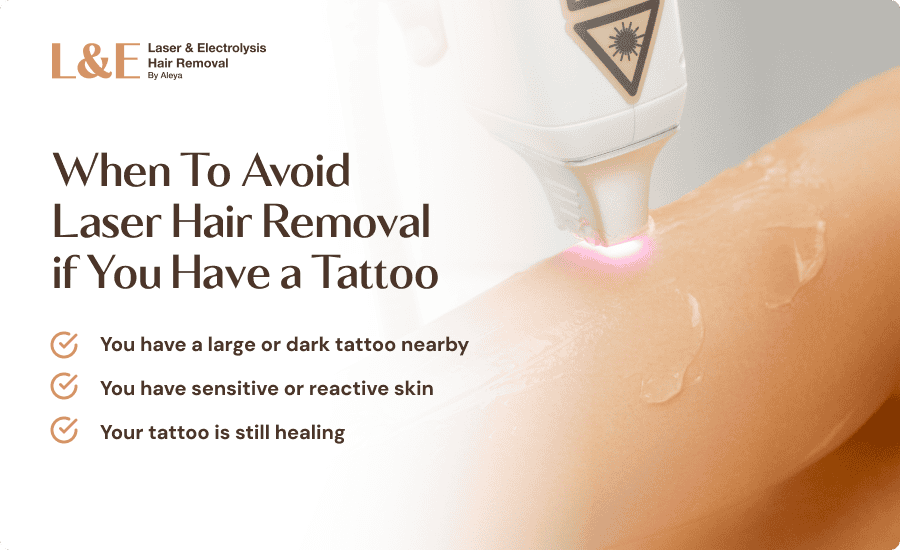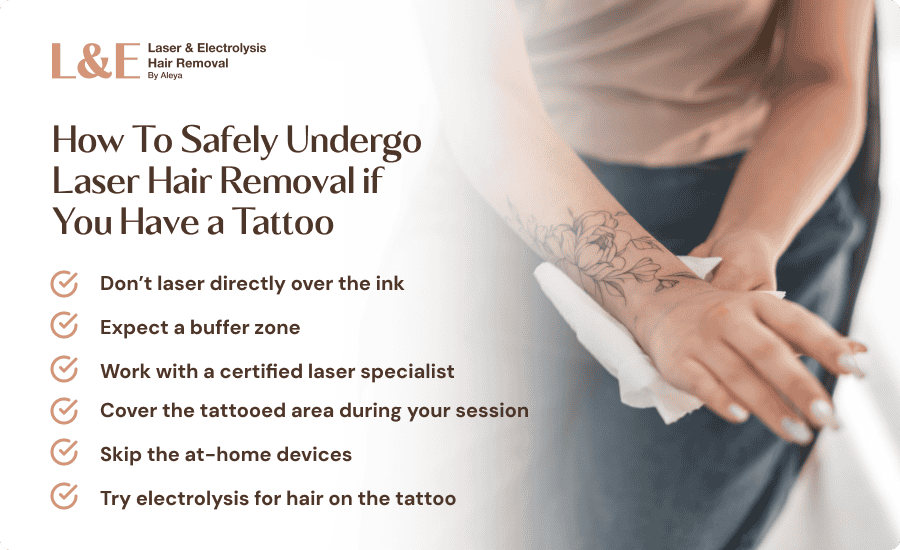Does Laser Hair Removal Affect Tattoos? [Tips & FAQs]
![Does Laser Hair Removal Affect Tattoos? [Tips & FAQs]](https://www.laserbyaleya.com/wp-content/uploads/2025/10/does-laser-hair-removal-affect-tattoos-hero-image.png)
Does Laser Hair Removal Affect Tattoos? Key Takeaways
- Yes, laser hair removal can affect tattoos because the laser is attracted to pigment
- Laser hair removal should never be done directly over a tattoo because it can increase the risk of burns, blisters, and scarring
- Hair removal lasers can’t remove tattoos
Did you know that one-third of American adults are permanently inked?
With tattoos more popular than ever, it’s no surprise that many people are asking: “Does laser hair removal affect tattoos?”
Yes, laser hair removal can unfortunately affect tattoos. The treatment might cause the skin to burn, the tattoo ink to fade, or the area to become irritated or damaged during the process.
In this guide, we will:
- Walk you through everything you need to know about laser hair removal and tattoos
- Answer why does laser hair removal affect tattoos
- Show you which areas can be safely treated if you have tattoos, plus what zones are off-limits
- Give expert-backed tips to protect both your skin and your ink
- Explain how Laser by Aleya creates personalized treatment plans using advanced technology and techniques to safely work around tattoos
Why Does Laser Hair Removal Affect Tattoos?
Laser hair removal can affect tattoos because lasers are drawn to pigment.
The laser is designed to target pigment in hair follicles, but tattoo ink also contains pigment.
When applied over tattooed skin, the laser can mistake the ink for hair, causing burns, blisters, or skin damage.
What Happens if Laser Hair Removal Is Done Over a Tattoo?
Long story short: laser hair removal and tattoos just don’t get along.
Here’s what can go wrong (and why you definitely don’t want to test it).
1. It Can Cause a Dangerous Buildup of Heat
Because tattoos absorb a lot more energy than hair follicles, the laser can send too much heat into the skin.
Instead of a quick zap to one follicle, the entire tattooed area absorbs the heat, which can lead to pain and overheating.
2. You Risk Burns, Blisters, or Scarring
Too much heat in one spot can irritate the skin. If a laser is used directly on a tattoo, it can cause:
- Burns
- Even permanent scarring
3. Your Tattoo Can Get Damaged
Even if your skin tolerates the laser, your tattoo may still be at risk.
The laser can cause the ink to fade, the design to distort, or create uneven patches in the pigment.

Can Laser Hair Removal Eliminate Tattoos?
No, laser hair removal won’t fade or get rid of tattoos.
Although laser hair removal and tattoo removal both use laser technology, each is designed for a completely different job.
Hair removal lasers focus on the pigment in your hair follicles, while tattoo removal lasers break up ink particles so your body can clear them out over time.
When Should You Avoid Laser Hair Removal if You Have a Tattoo?
Laser hair removal can be done safely around tattoos, but it’s not right for everyone.
If any of the following sound like you, you’ll want to take extra care (or explore other options):
1. You’ve Got a Large, Dark, or Heavily Shaded Tattoo Nearby
The more ink in the area, the more likely it is to absorb heat from the laser, even if the tattoo isn’t directly treated.
This can increase the risk of burns, irritation, or ink distortion, especially with dense or black tattoos.
2. Your Skin Is Sensitive or Reacts Easily
If you’re prone to redness, irritation, or post-inflammatory hyperpigmentation, your skin might be more reactive to laser treatments, especially near tattooed areas.
Your laser specialist can help you decide if laser is still a safe choice.
3. Your Tattoo Is Still Healing
If your tattoo is new, give it time.
The skin needs to fully heal before any laser treatments nearby, usually at least eight to 12 weeks.
If you try laser too soon, it can mess with how your tattoo heals and might even distort the ink.

Can You Still Get Laser Hair Removal if You Have Tattoos?
If you’re wondering, “Does laser hair removal affect tattoos?”, the good news is that treatment is still possible, as long as it’s done carefully.
You’ll just need to avoid lasering directly over the ink.
For example:
- Got a tattoo on your forearm? No problem because your upper arm can still be treated
- Ink on your back? You’re still good to go for your legs, underarms, or bikini line
A skilled laser specialist will work around your tattoos and build a custom plan to help you get smooth, hair-free skin exactly where you want it.
How To Safely Undergo Laser Hair Removal Over Tattoos
Still wondering, “Does laser hair removal affect tattoos?”
If you’ve got some ink, that doesn’t mean you’re stuck with razor burn or shaving forever.
You don’t have to skip laser; you just need to know how to work around your tattoos without messing with them.
That’s where the right technique (and the right technician) can make all the difference.
1. Don’t Laser Directly Over the Ink
This one is non-negotiable. The laser can overheat the area, putting you at risk of burns, blisters, or even scarring.
So even if you badly want to reduce hair from your floral tattoo on your leg, it’s safer to treat the areas around it.
2. Leave Room Around the Tattoo During Your Treatment
A skilled laser specialist won’t just avoid the tattoo; they’ll also give it some breathing room.
Most technicians leave a one-inch buffer around your tattoo and cover it with a protective patch, since laser heat can travel beneath the skin. That extra space helps prevent damage.
3. Always Work With a Certified Laser Specialist
A qualified technician knows exactly how to treat areas around tattoos without complications.
They’ll create a plan that works with your body art, not against it.
4. Cover the Tattooed Area During Your Session
Before your session begins, your technician should cover your tattoo with a protective patch or wrap.
This barrier helps block stray laser energy, keeping both your skin and your ink safe.
5. Skip the At-Home Devices
DIY laser tools might seem like a quick fix, but they’re not made to handle tattoos.
Without proper settings or protection, you could end up burning your skin or messing up your ink.
6. Try Electrolysis for Hair on the Tattoo
If you’re looking to remove hair directly from your tattoo, electrolysis is a great option.
It doesn’t rely on pigment, so it won’t interfere with your ink. Plus, it permanently treats each follicle.

Find Safe Laser Hair Removal at Laser by Aleya
Still asking yourself, “Does laser hair removal affect tattoos?” You’re not alone, and Aleya knows how to work safely around your ink.
If you have tattoos, sensitive skin, or just want smooth results without the risk, Laser by Aleya is a trusted place to start.
Aleya is an expert at working safely around tattoos and uses the Lumenis Diode LightSheer, one of the most advanced laser systems on the market.
You’ll get personalized care, smart treatment planning, and results that respect both your skin and your ink.
Does Laser Hair Removal Affect Tattoos? FAQs
Does laser hair removal affect tattoos?
Yes, it can.
Laser hair removal should never be done directly over a tattoo, as the laser can react with the ink, leading to burns, blisters, or skin damage.
Does laser hair removal hurt more on tattooed skin?
Yes. If performed over a tattoo, laser hair removal can be significantly more painful due to how the ink absorbs heat.
But ideally, tattooed skin should be avoided altogether during treatment.
How does laser hair removal work?
Laser hair removal uses light to target the pigment in your hair.
The light turns into heat, which travels down the shaft and damages the follicle (the part that grows new hair).
Over time, this slows regrowth and can lead to significant reduction.
Since the laser is designed to seek out pigment, it’s easy to see why people wonder, “Does laser hair removal affect tattoos?”
Tattoo ink is also pigment-rich and that can make things tricky without the right care.
Does shaving over a tattoo make it fade?
No. Shaving only removes hair at the surface and won’t affect the ink beneath your skin.
So, while people often ask, “Does laser hair removal affect tattoos?”, shaving is completely safe and won’t damage your body art.
Can laser hair removal be done near a tattoo?
Yes, as long as it’s done carefully.
An expert laser specialist will avoid the tattoo itself, usually leaving a one-inch buffer around it.
They might also place a protective patch over the ink to make sure no stray laser energy hits it.
Can laser hair removal spread tattoo ink?
It’s rare, but it can happen.
If the laser hits the tattoo, it might disrupt the ink and make the edges look a bit blurred or spread out.
What happens if the laser accidentally goes over a tattoo?
That’s where things can go wrong. The laser can overheat the ink, which might lead to burns, blisters, or even long-term scarring.


